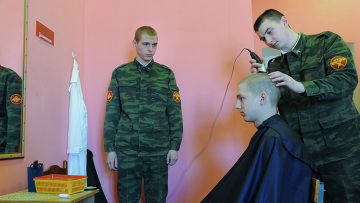
Chechnya’s Exclusion from Military Conscription Shows Moscow’s Weak Hold over Region
Publication: Eurasia Daily Monitor Volume: 10 Issue: 177
By:

Generally, the military conscription campaign in Russia becomes relevant for Chechnya and the North Caucasus twice a year—in the spring and in the fall, when the Russian president issues a decree ordering the start of the draft season (https://www.rg.ru/2013/09/30/prizyv-dok.html). Conscription in Russia is still mandatory, and the intentional evasion of military service is punishable by up to two years in prison or fines of about $6,000 (https://armeyka.net/articles/516/). Despite these drastic measures, Russia still cannot draft enough young people. According to the Russian Ministry of Defense, 300,000 conscripts are drafted every year—an insufficient number for the full staffing of the army. The Russian army is currently manned at 82 percent of its needs and has ceased to be a force with over a million people (https://ria.ru/analytics/20130918/964083066.html).
Despite this deficit in the number of conscripts, Russia has repeatedly refused to draft young people from among the indigenous populations of the North Caucasus, Chechens and Dagestanis in particular. At the same time, the few ethnic Russians left in Dagestan are still drafted, but not the ethnic groups indigenous to the republic. That is why only a handful of people will be drafted from all of Dagestan (https://www.ng.ru/armies/2013-05-31/1_kavkaz.html). In theory, Dagestan could supply as many as up to 30,000 draftees. But the yearly military draft quota on this republic of nearly 3 million people is expected to yield about 4,000–5,000 conscripts. In comparison, the city of Moscow, with a population of 11 million, supplies only about 6,000 draftees (https://www.rg.ru/2013/09/19/priziv-site.html). The few Dagestanis who successfully insist on being drafted will be drafted not by the defense ministry, but by the Ministry of Interior, and will serve in the republic (https://www.bigcaucasus.com/events/topday/26-11-2012/81592-armiya-0/). Thus, the conscripts from Dagestan will be serving at home—that is, in Russia’s hottest security spot.
The neighboring republic of Chechnya has not drafted residents for the Russian army since 1992. Chechnya has up to 80,000 young men suitable for military conscription (https://www.ng.ru/armies/2013-10-02/1_genshtab.html). As an experiment, in the fall of 2001, several dozen Chechens were drafted into a military unit based in the Moscow region. However, the Chechen conscripts returned home after several months, following multiple conflicts with their peers and officers (https://www.kavkaz-uzel.ru/articles/230805/). Moreover, for the first time in the history of the Russian army, the Chechen conscripts convinced the military to provide them with halal food and prayers rooms, as well as to allow them to attend Friday prayer. All of this convinced Russia’s leadership to end drafting Chechen youth into the Russian army, and no Chechens from Chechnya have been called up since then (https://dagestan.kavkaz-uzel.ru/articles/199966/).
An attempt to restart the Russian military draft in Chechnya in 2007 sparked protests among the residents of the republic. Chechnya’s human rights ombudsman, Nurdi Nukhazhiev, was forced to say that it was too early to raise this issue in Chechnya. In Nukhazhiev’s words, Chechnya “experienced two wars in the past 15 years, and generations grew in the republic that do not know what a united Fatherland is.” He stated that Russian media had “indulged in a rampant anti-Chechen propaganda that created a negative attitude toward Chechens among the vast part of the Russian society and the army is a mirror that reflects all the problems of society” (https://www.kavkaz-uzel.ru/articles/116923/).
In response to the Russian leadership’s unwillingness to draft Chechens, Chechen leader Ramzan Kadyrov issued a decree “About Organizing the Draft of Citizens Born in 1986–1995 for Military Service in October–December 2013 on the Territory of the Chechen Republic” (https://chechnya.gov.ru/page.php?r=200&id=123). Formally, Kadyrov has no legal powers to issue such decrees, as this is the prerogative of the Russian president alone (https://www.chechnya.gov.ru/page.php?r=67). Still, Kadyrov intends to draft a certain number of young people for service on the territory of Chechnya. In the spring 2013 draft campaign, 120 young men were already drafted in Chechnya, 90 of whom were sent to serve in the Sever special battalion, while the other 30 men joined the Yug special battalion (https://www.kavkaz-uzel.ru/articles/226331/?print=true).
The Russian army units based in Chechnya also do not want to hire residents of the republic for professional military service. In order to be hired in Chechnya as professional members of the military, Chechens have to leave the republic, obtain registration in a nearby region and then ask to be dispatched to Chechnya (https://www.kavkaz-uzel.ru/articles/230805/).
Among the reasons that the authorities cite to explain their refusal to draft Chechens and Dagestanis, the primary one is that the Russian government is afraid that after serving in the Russian army, Chechen or Dagestani soldiers could end up on the other side of the barricades—with the militants from the armed resistance movement (https://www.ng.ru/armies/2013-05-31/1_kavkaz.html). It is hard not to agree with these conclusions, since among North Caucasians, young people are the most hostile to Russian policies in the region. At the same time, humiliations carried out by North Caucasian army conscripts against Slavic conscripts evoke outrage among the Russian population and increase anti-Caucasian sentiment in the Russian society at large (https://kavpolit.com/dagestancy-i-armiya-prosochitsya-lyuboj-cenoj/).
Restrictions in the military draft are not uniform even within the North Caucasus region. For example, Ossetians, Adygeans, Kabardians, Cherkess, Balkars and Karachays are all drafted according to the common rules, although Slavs are given priority over them. Thus, Russia’s leadership has divided the North Caucasus into two parts: Chechnya, Dagestan and Ingushetia, on one side, and all the other republics—Kabardino-Balkaria, North Ossetia, Karachaevo-Cherkessia and Adygea—on the other.
What is clear from these conscription policies is that Russia’s central government is weakening. The fact that Chechens and Dagestanis are not drafted by the Russian military demonstrates the low level of actual control that Moscow exercises in these republics. The growing decentralization of Russian power in the North Caucasus risks Russia’s own breakup—the separation of part of the North Caucasus from the Russian Federation.




